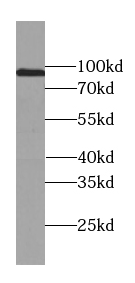Products
USP13 antibody
Category:
Research Area:
- SPECIFICATIONS
- Product Name
- USP13 antibody
- Catalogue No.
- FNab09309
- Size
- 100μg
- Form
- liquid
- Purification
- Protein A+G purification
- Purity
- ≥95% as determined by SDS-PAGE
- Clonality
- monoclonal
- Isotype
- IgG1
- Clone ID
- 9E6
- Storage
- PBS with 0.02% sodium azide and 50% glycerol pH 7.3, -20℃ for 12 months(Avoid repeated freeze / thaw cycles.)
Immunogen
- Immunogen
- ubiquitin specific peptidase 13(isopeptidase T-3)
- Alternative Names
- Deubiquitinating enzyme 13 antibody, Isopeptidase T 3 antibody, IsoT 3 antibody, ISOT3 antibody, Ubiquitin thiolesterase 13 antibody, USP13 antibody
- UniProt ID
- Q92995
- Observed MW
- 97 kDa
Application
- Tested Applications
- ELISA, WB, IHC, IF
- Recommended dilution
- WB: 1:500-1:5000; IHC: 1:20-1:200; IF: 1:20-1:200
Validated Images
 HepG2 cells were subjected to SDS PAGE followed by western blot with FNab09309(USP13 Antibody) at dilution of 1:1000
HepG2 cells were subjected to SDS PAGE followed by western blot with FNab09309(USP13 Antibody) at dilution of 1:1000
 Immunohistochemistry of paraffin-embedded human testis tissue slide using FNab09309(USP13 Antibody) at dilution of 1:200
Immunohistochemistry of paraffin-embedded human testis tissue slide using FNab09309(USP13 Antibody) at dilution of 1:200
- Background
- Deubiquitinase that mediates deubiquitination of target proteins such as BECN1, MITF, SKP2 and USP10 and is involved in various processes such as autophagy and endoplasmic reticulum-associated degradation(ERAD). Component of a regulatory loop that controls autophagy and p53/TP53 levels: mediates deubiquitination of BECN1, a key regulator of autophagy, leading to stabilize the PIK3C3/VPS34-containing complexes. Also deubiquitinates USP10, an essential regulator of p53/TP53 stability. In turn, PIK3C3/VPS34-containing complexes regulate USP13 stability, suggesting the existence of a regulatory system by which PIK3C3/VPS34-containing complexes regulate p53/TP53 protein levels via USP10 and USP13. Recruited by nuclear UFD1 and mediates deubiquitination of SKP2, thereby regulating endoplasmic reticulum-associated degradation(ERAD). Mediates stabilization of SIAH2 independently of deubiquitinase activity: binds ubiquitinated SIAH2 and acts by impairing SIAH2 autoubiquitination. Has a weak deubiquitinase activity in vitro and preferentially cleaves 'Lys-63'-linked polyubiquitin chains. In contrast to USP5, it is not able to mediate unanchored polyubiquitin disassembly. Able to cleave ISG15 in vitro; however, additional experiments are required to confirm such data.



